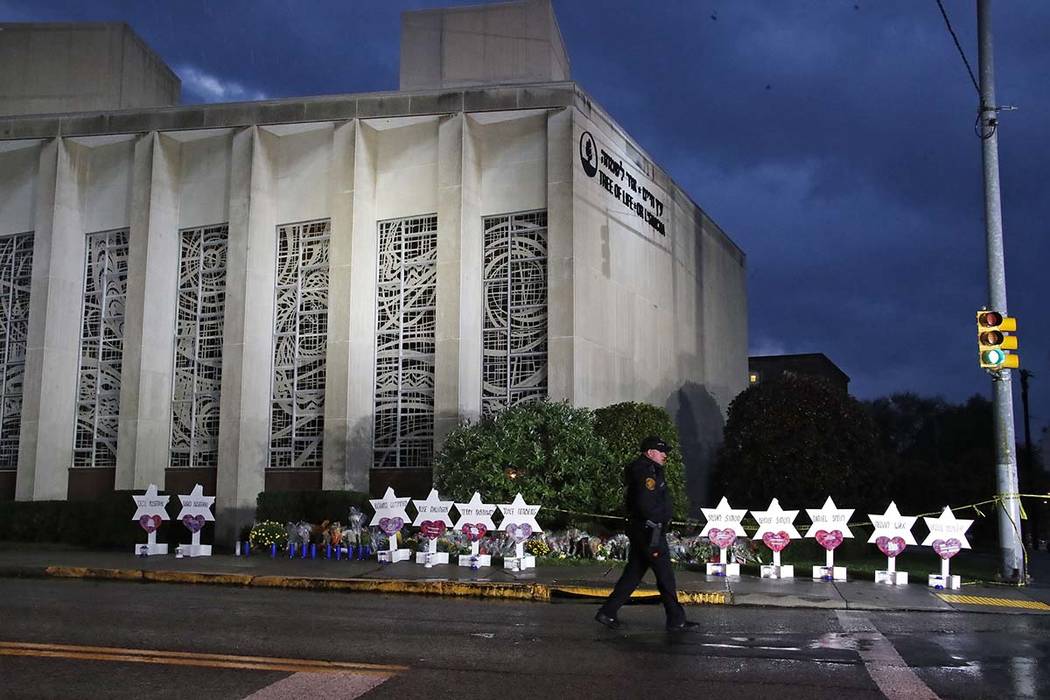Hate speech can be difficult to track, Las Vegas experts say
How big of a problem hate speech is in Las Vegas is unclear because it is difficult to track, experts say.
“Numbers in this sense are very hard to deal with. Many of these folks don’t want you to know who they are, and so it’s difficult to get hard numbers,” said Robert Futrell, professor of sociology at UNLV with expertise in political extremism. “It depends, too, on the definition one uses for hate speech.”
But that doesn’t mean hate speech isn’t being monitored in Las Vegas, according to Metropolitan Police Department spokesman Jay Rivera.
Housed at Metro’s headquarters, the Southern Nevada Counter Terrorism Center works to identify and stop potential threats. The specialized division is made up of 27 local agencies, including Las Vegas, Henderson and North Las Vegas police, the FBI, Clark County Fire Department and Nevada Highway Patrol.
“Just like we patrol the streets, we patrol the internet,” Rivera said. “They’re online, watching the news all the time, looking for anything suspicious. They’re looking at what people are tweeting, posting on Facebook.”
But, he said, the division does not collect data specific to hate speech, although both Metro and the FBI maintain annual records of hate crimes.
In terms of hate speech, Futrell said, law enforcement faces a “very, very hard task.”
On Saturday, at least 11 people were shot and killed at the Tree of Life Congregation in Pittsburgh’s Squirrel Hill neighborhood during a baby-naming ceremony. The suspect in the attack had no apparent criminal record, but expressed virulently anti-Semitic views on social media leading up the shooting, The Associated Press reported.
“We have the right to free speech. Until that goes over the legal line, there isn’t much law enforcement can do other than surveillance,” Futrell said. “This is the dilemma of a free society.”
He also noted that when law enforcement chooses to intervene and how it intervenes “is a whole different question altogether.”
“I don’t think we have an answer for it quite frankly,” Futrell said.
Making such a determination can be a fine line, acknowledged Heidi Beirich, director of The Southern Poverty Law Center’s Intelligence Project, which tracks and exposes the activities of hate groups and extremists.
“There is so much hate speech online these days, it’s hard to tell what’s an actual threat,” she said. “You have to think seriously about civil liberties when monitoring hate speech.”
Futrell said he has seen in his research a normalization of aggressive racist and anti-Semitic claims.
“Before, these groups would have to connect in hidden spaces,” he said. “But now they feel emboldened to say things and even act on these ideas, which, just a few years ago, they did not feel they could do without some retribution.”
The ability to hide behind a computer screen also makes hate speech difficult to quantify, Futrell said.
“You don’t have to reveal who you are,” he explained. “So who it’s coming from is sometimes yet another question.”
But law enforcement cannot be absent from the online space just because hate speech is difficult to track, Beirich said.
“Collecting and analyzing it, you would need algorithms and special programs,” she said. “But law enforcement could deploy those technologies if they really wanted to.”
Citing privacy issues, Metro’s Rivera said the Southern Nevada Counter Terrorism Center has no immediate plans to start keeping records of online hate speech, but reminded the public that “it’s everybody’s responsibility.”
“We are much more effective when the community fulfills their role,” he said. “Their role is to be observant. They know better than us what’s normal in their place of work, their place of worship, where they live.”
Futrell said members of the public also have a responsibility to ask themselves, “What’s my individual role and my collective role in limiting the effects of hate speech?”
Contact Rio Lacanlale at rlacanlale@reviewjournal.com or 702-383-0381. Follow @riolacanlale on Twitter.
UNLV hate crimes by the numbers
University police investigate all reports of hate speech and crimes, according to Sgt. Paul Velez. In October, a Swastika was carved onto the door of two Jewish students' dorm room, marking the second on-campus hate crime reported this school year, Velez said. A suspect had not been identified as of Tuesday.
— 2015: UNLV police investigated one property crime characterized by racial bias.
— 2016: No hate crimes were reported.
— 2017: UNLV police investigated one property crime characterized by religious bias.
Hate crimes across the valley
— In 2014, Metro investigated 17 hate crimes; Henderson investigated 2; and North Las Vegas, 1.
— In 2015, Metro investigated 41 hate crimes; Henderson investigated 8; and North Las Vegas, 6.
— In 2016, Metro investigated 26 hate crimes; Henderson investigated 11; North Las Vegas, 4.
Source: FBI


















